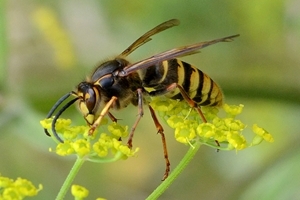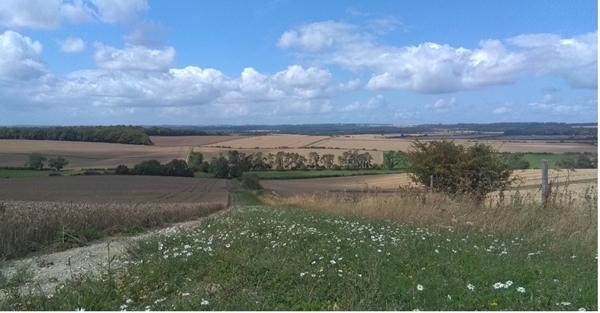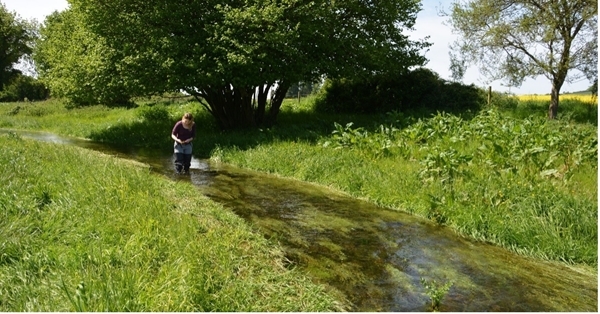By Jess Brooks, Biodiversity Advisor
Rivets in a ship
 The earth we live on is an intricately engineered, delicately balanced life-support system. Be it a worm, a tree, a mole, or a bee; a cloud, a teaspoon of soil, or the sea – almost anything in the environment that you can name (even the common wasp) is part of our life-support machine.
The earth we live on is an intricately engineered, delicately balanced life-support system. Be it a worm, a tree, a mole, or a bee; a cloud, a teaspoon of soil, or the sea – almost anything in the environment that you can name (even the common wasp) is part of our life-support machine.
You could think of humanity as a ship, where the rivets holding the hull together are all of the living and non-living elements in the world. If a critical number of rivets get damaged or fall out, we sink.
The job performed by the rivets – to hold humanity’s ship together – is basically what we mean by ecosystem services. They can be defined as functions of the natural world that sustain us and provide us with food, energy and materials, clean air and water, and recreation.
| Top facts about earth’s ecosystem services |
Provisioning
Three billion tonnes of iron ore were extracted from the earth in 2020 for the global construction industry1. That is the equivalent to 50 times the weight of the Great Wall of China! |
Regulating
The trees in Hyde Park, London, remove a total of 2.7 tonnes of pollutants each year and store 3,900 tonnes of CO22. |
Supporting
Wild insects contribute over £36 million per annum to Cox and Gala apple production in the UK through pollination3. |
Cultural
Two million people visit the Great Barrier Reef each year for tourism activities4 and the reef supports 64,000 jobs5. |
Practically every animal, plant and material in the world is essential or useful to humans – in fact it’s difficult to pick out something that isn’t!
They all fall into one of four categories:
- Provisioning – food, water, materials, energy
- Regulating – air and water filtration, sequestration of carbon
- Supporting – pollination by insects, bioengineering by keystone species
- Cultural – recreation, lifestyle, mental wellbeing, creative inspiration
How long is a piece of string?
Some ecosystem services are difficult to comprehend or appreciate. Take a nest of 10,000 common wasps (Vespula sp.) for example. They have a bad reputation for picnic-bothering, but they actually perform a very important ecological role, to the point where it’s difficult to decide where their benefits to society end. This nest of wasps can hunt up to 8kg of aphids, caterpillars and other crop and garden pests in a single summer6 to feed their larvae, reducing need for chemical pesticides. Seeking nectar to fuel those hunting trips, they may pollinate 250 apple trees in an orchard, which supplies a multi-million-pound apple juice company, that goes on to supply five hospitals, two breweries, and a chain of restaurants. So, next time someone asks you what the point of a wasp is, you could retort with ‘how long is a piece of string?’!
Realising that we need to improve society’s understanding of ecosystem services, scientists and economists have started to quantify the benefits we receive from nature so that they are taken seriously. Nature’s assets, widely referred to as natural capital, enable those that operate in cash and budgets to make decisions and shape policy on the management of our land and natural features and, hopefully, ensure they are recognised and protected for their worth.

The very air we breathe
One of the best examples of ecosystem service valuation in the UK is the cleaning of our air, because we can equate it directly to costs to human health.
Because of air pollution, the very air we breathe is considered the greatest environmental risk to public health and kills up to 36,000 men, women, and children a year in the UK7 – enough to fill London’s O2 arena one and a half times. It debilitates millions more. As sad as it is unsurprising, many of our urban areas frequently fail the World Health Organisation’s air quality standards.
Fortunately for us, the countryside removes huge volumes of harmful air pollutants. Woodland is best at removing particulate pollution (which accounts for the most health damage), and farmland vegetation is best at removing ozone and nitrogen dioxide8. The illness and death caused by these three pollutants will cost our health services a whopping £1.8 billion between 2017 and 20257. The farmland and woodland natural capital in this scenario provided an air cleansing service worth just under £1 billion in the UK in 2015 alone8 – equating to several years’ worth of cost savings to the health services.
It is clear from this example, that without farmland and semi-natural habitats cleaning up our air, many more people would become ill and die from air pollution.

Farmers providing ecosystem services
Going forward, farmland has a critical role to play in maintaining the natural processes that we depend on. We urgently need to channel funds to land managers who can deliver the enhancement and protection of ecosystem services such as:
- Planting trees or hedges to remove air pollution and sequester carbon dioxide
- Planting cover crops to prevent soil erosion and restore organic matter
- Managing grasslands to maximise flower species diversity for pollinators
Government support through agri-environment schemes will be important for widespread delivery of these measures, but the private sector has huge potential too. As an example of farmers taking delivery of ecosystem services into their own hands, you may have heard about a group of 80 land managers in southern England called the Environmental Farmers Group (EFG). With support from the GWCT’s new Natural Capital Advisory service, they are trading nature credits with organisations and companies in the private sector on a landscape scale. The farmers are hoping to offset biodiversity losses from development, clean up the river catchment, and achieve net zero farming by 2040.
Everyone can help
The EFG is ambitious and exciting, but you don’t have to be a farmer to make a difference. Everyone can do something to help keep those rivets in place, because we all need Earth’s natural processes to be ship-shape. Whether it is tolerating a wasp at your picnic, campaigning for better air quality for our children, or getting creative with habitats in your garden, take up the challenge. And together we can do enough to stay above the waves.
References
- Idoine, N.E., Raycraft, E.R., Shaw, R.A., Hobbs, S.F., Deady, E.A., Everett, P., Evans, E.J. & Mills, A.J. (2016). World Mineral Production 2016-2020. Keyworth, Nottingham.
- Dr Kieron Doick, Phillip Handley, Kathryn Hand, Kenton Rogers, Jessica Goodenough, Kevin Frediani & James Watson. (2016). An integrated assessment of tree benefits in Hyde Park using i-Tree Eco and Capital Asset Valuation for Amenity Trees.
- Garratt, M.P.D., Breeze, T.D., Jenner, N., Polce, C., Biesmeijer, J.C. & Potts, S.G. (2014). Avoiding a bad apple: Insect pollination enhances fruit quality and economic value. Agriculture, Ecosystems & Environment, 184:34–40.
- GBRMPA - Great Barrier Reef tourist numbers. Available at: https://www.gbrmpa.gov.au/our-work/Managing-multiple-uses/tourism-on-the-great-barrier-reef/numbers. (Accessed: 6th July 2022)
- Great Barrier Reef Marine Park Authority – Reef facts. Available at: https://www.gbrmpa.gov.au/the-reef/reef-facts. (Accessed: 6th July 2022)
- Brock, R.E., Cini, A. & Sumner, S. (2021). Ecosystem services provided by aculeate wasps. Biological Reviews, 96:1645-1675.
- Air pollution: applying All Our Health - GOV.UK. Available at: https://www.gov.uk/government/publications/air-pollution-applying-all-our-health/air-pollution-applying-all-our-health. (Accessed: 23rd June 2022)
- UK natural capital: ecosystem accounts for freshwater, farmland and woodland. Available at: https://www.ons.gov.uk/economy/environmentalaccounts/bulletins/uknaturalcapital/landandhabitatecosystemaccounts. (Accessed: 23rd June 2022)